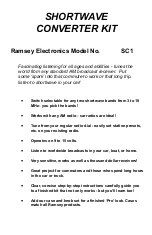
8
Connect the supplied AC to DC adapter to the rear of the unit, insuring that the
power switch is in the off position. Next connect the adapter to an available AC
source.
Connect the appropriate cables to one or both of the inputs and also to the
appropriate output of the Converter/TBC and then to the external devices.
Connect a Composite Video signal to use as a Genlock source if you wish the
output of the unit to be in time with your studio reference. Move the 75
termination switch to the “On” position if you’re not looping the reference signal
through the unit to another device.
When you have finished connecting the cables, move the unit’s power switch to
the ‘On’ position.
5.0
OPERATING THE UNIT
5.1
Initial Power Up
When power is applied to the unit, it will default to the auto detect mode and
select the proper Television Standard. The LED labeled “Auto” will be illuminated
and the lighting of the LED above a particular letter group on the top row of LEDs
will indicate the standard detected. An LED will light on the bottom row to
indicate what output standard has been selected using the letter group above it
as your indication of the standard’s type.
The meaning of the abbreviations on the row of LEDs is as follows:
Auto
Auto-Detect the TV Standard
NTSC
NTSC 3.58 Mhz Standard
N 4.43
NTSC 4.43 Mhz Standard
PAL
PAL B,D,G,I and K Standards
PAL-M
PAL-M Standard
PAL-N
PAL-N Standard
SECAM SECAM Standard
As examples of how the auto-detect works; if you live in the United States or
Japan, the input will be the NTSC 3.58 Mhz Standard and the unit will light the
“Auto” LED and the “NTSC” LED. If you live in the United Kingdom, the standard






























